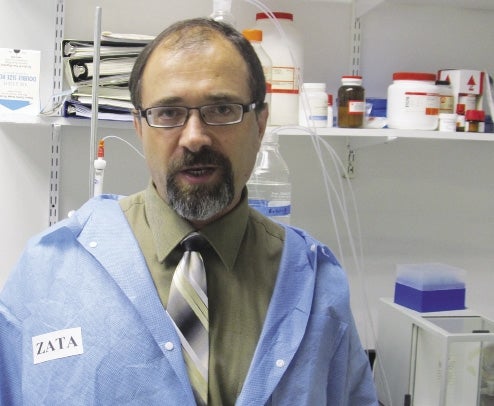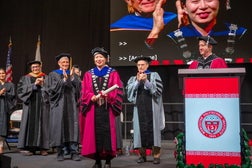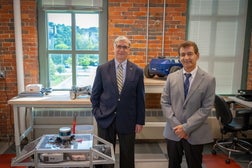A Business Education For Scientists: Biotech Group Helps Startups
Tucked away inside a small lab in Worcester, David Tabatadze has been working to create genetic constructs that he hopes can one day be used to cure cancer, Alzheimer's and other potentially fatal diseases.
A native of the Eurasian country of Georgia, Tabatadze came to the United States 17 years ago to study under genetic therapy pioneer Paul Zamecnik. The two founded Zata Pharmaceuticals in 2008, a year before Zamecnik died of cancer at the age of 96.
Now at the helm of the small startup, Tabatadze is learning just how difficult it can be to find financial backers to take a chance on his science. He certainly believes in it, though.
Laid off from a previous job 10 months ago, he has been working full time at Zata since. He refinanced his home and is living off his savings. The several executives that work for Zata are mostly donating their time, he said, in hopes the technology takes off. They work out of a small incubator lab owned by Massachusetts Biomedical Initiatives (MBI) on Barber Avenue.
Zata is working on a more efficient, effective and safe way to deactivate disease-causing genes. “Knocking down” genes has been possible for more than three decades, but no one has been able to commercialize a therapy using the method to treat a major genetic disorder, he said.
Tabatadze is trying to learn from those failures, but he acknowledged that investors have become skeptical of the field because of them.
Zata needs financial support to further develop its technology. Human trials are still a ways off. The company needs more data to verify that its genetic constructs work properly.
“You need a connection in the business community or with potential investors, which is a weak point I am facing,” he said.
Science And Business
Tabatadze is hoping to improve his odds of getting funding through a program offered by the Massachusetts Biotechnology Council (MassBio), called MassConnect.
MassBio is providing several biotech industry veterans to counsel and mentor Tabatadze over the next two months. His first official meeting with his new mentors took place earlier this month in Boston.
He said he's excited to absorb new knowledge and hopes his mentors can help further refine his pitch to investors.
More than 150 biotech industry scientists, investors and attorneys have volunteered their time with MassConnect since the program was created in 2008, said Rakhshita Dhar, who oversees the program at MassBio.
“These scientists are masters of what they're doing,” Dhar said. “What we're trying to do is help them shape all of that information and put it in a story and help them think about the business value.”
Of the several dozen startups who have completed the MassConnect program, 12 percent have found financing, which is a good number in the biotech world, Dhar said.
Research and development funding in the biotech industry dropped steeply in the recession, and has only recovered halfway since, according to figures from Ernst & Young.
Large pharmaceutical and biotech companies are looking to buy companies with new technologies, Dhar said, but that pipeline needs to be nourished.
Graduates Reflect
Just how far MassConnect will take Zata remains to be seen, but other Central Massachusetts startups help shed light on the program.
VitaThreads, a company founded at Worcester Polytechnic Institute, completed the program earlier this year. It has developed a biomaterial microthread that can be coated with adult stem cells before sewing up damaged tissue in the heart, muscles and other areas of the human body, said Adam Collette, the company's co-founder. Collette's MassConnect mentors' critiques were often a reminder that there was much more work to do, he said. “They really exposed a lot of our naiveté, but it was done in an extremely professional and an extremely helpful fashion,” Collette said.
And it helped him better understand VitaThread's potential spot in the marketplace.
“One of the chief goals we harped on at MassConnect is that we are an extremely important piece of a solution, but we aren't an independent solution,” Collette said. “We actually need something else with our threads. We're a delivery vector.”
In short, VitaThreads will need to partner with a cell therapy company. Collette said talks are ongoing with several potential partners. And as the company pursues funding, its founders are “bootstrapping” as best they can, he added.
If VitaThreads is a few steps ahead of Zata on the road to commercialization, then Advirna has a few steps on all of them.
Looking For Initial Sale
Advirna is looking to make its first sale of its RNA interference molecules, which can be used to deactivate genes.
In some ways, Advirna's technology is similar to Zata's. But though their companies are in different stages of development, Tabatadze and Advirna CEO and founder Alexey Wolfson believe one technology could complement the other and may even lead to a partnership.
Founded in 2007 in Colorado, Advirna moved to Massachusetts in 2010 after it sold the therapeutic rights to its technology to Westborough-based RXi Pharmaceuticals Corp. RXi relicensed the nontherapeutic rights back to Advirna, which allows Wolfson, who went through the MassConnect program in 2010, to pursue the research market.
He's focusing on a niche market in hard-to-transfect cells, such as neurons.
Though he has an MBA degree in addition to his science training, Wolfson said he was unprepared to commercialize his technology.
“After passing through MassConnect, I started to get at least some interest from potential investors,” Wolfson said.
Wolfson gained new knowledge in MassConnect, and that has made things that previously seemed difficult or impossible seem more accessible.
“It's interesting to grow a company and I see that I'm growing myself and today I cannot imagine myself running a company of 50 people, but a year from now, maybe I will,” Wolfson said. “I'm growing with the company.”
Read more
Growing Cells And Innovation: WPI Launches Biofabrication Graduate Program
Report Says Biopharma Jobs In Mass. Hit New High In 2011















0 Comments